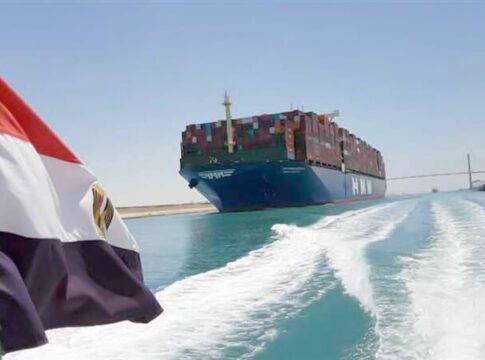Egyptian President Abdel Fattah El-Sisi convened with Admiral Osama Rabiee, Chairman of the Suez Canal Authority (SCA), and Mostafa El-Degeishy, CEO of the South Red Sea Shipyard Company, to review the latest transformations underway in Egypt’s most vital economic corridor — the Suez Canal.
According to the Presidency’s official spokesperson, the meeting spotlighted Egypt’s ongoing efforts to safeguard and modernize the canal’s infrastructure, reinforce global shipping confidence, and position the Suez Canal as a strategic anchor for economic recovery and industrial localization amid continued global trade disruptions.
A key milestone presented during the meeting was the full commissioning of the Southern Sector Development Project, operational since February 2025. The project, which aimed to widen and deepen key bottleneck segments of the canal, is expected to significantly reduce vessel waiting times and increase the daily transit capacity by 20–25%, according to internal figures shared with Middle East Observer.
“Widening the canal in the southern sector is not just an engineering feat — it’s a geopolitical statement,” said Dr. Lobna Hafez, a maritime logistics expert at the Arab Academy for Science, Technology and Maritime Transport. “It signals Egypt’s determination to future-proof its most valuable economic asset, especially amid mounting Red Sea security challenges.”
The meeting also confirmed the completion of the Ismailia Water Treatment Plant, with a capacity of 180,000 cubic meters per day, aimed at serving surrounding industrial zones and supporting sustainable development around the waterway.
Beyond physical expansion, President El-Sisi reviewed plans to restructure and upgrade the SCA’s maritime fleet, incorporating state-of-the-art tugboats, dredgers, and service units. This is part of a broader strategy to digitize and modernize navigational services and ensure Egypt remains a primary choice for major shipping lines amid increasing global uncertainty.
El-Sisi emphasized the importance of proactive client relations with international maritime players, especially during crises. “Strategic communications with top-tier shipping alliances and international maritime bodies is not optional — it’s essential,” he said, according to attendees familiar with the meeting.
One of the meeting’s most forward-looking elements was the localization of Egypt’s maritime industries. The President and his counterparts reviewed plans to build advanced deep-sea fishing vessels using local shipyards and technology — a step toward developing a fully integrated ecosystem for fish harvesting, production, and packaging.
“Localizing shipbuilding and marine industries aligns with Egypt’s industrial renaissance vision and the Made in Egypt 2030 initiative,” noted economist and trade analyst Hossam El-Din Rady. “The implications go beyond the Suez Canal. It’s about maritime sovereignty and job creation at scale.”
Sources within the SCA state that the Authority is in early-stage discussions with two Asian shipbuilding partners to co-develop a regional training hub in Port Said. The facility would offer vocational and engineering education to young Egyptians and regional maritime professionals, potentially supported by Gulf sovereign wealth funding.
The President also assessed updates on dredging operations in Bardawil Lake, part of a long-term plan to revitalize Northern Sinai and enhance biodiversity and fishing capacity. Additional infrastructure projects include the construction of new floating bridges to improve intra-regional connectivity and logistics mobility for both civilian and military use.
However, the canal’s role as a strategic chokepoint has come under renewed scrutiny amid ongoing security threats in the Red Sea, where attacks on commercial vessels have rerouted maritime traffic and impacted Egypt’s toll revenue. According to data released earlier this year by the SCA, canal revenues declined by over 40% year-on-year in Q1 2025 due to vessel diversions around the Cape of Good Hope.
In this context, President El-Sisi called for resilience-based planning to ensure the canal’s long-term reliability, urging the Authority to double down on its crisis-response protocols and invest in future-forward technologies, including AI-powered traffic management systems.
The Suez Canal is more than a waterway — it’s Egypt’s economic pulse. In FY 2023/2024, it contributed over $8 billion to national revenue, served nearly 12% of global trade, and enabled energy transit between Asia, Europe, and the Americas.
With global shipping alliances rethinking logistics hubs and geopolitical shocks reshaping trade corridors, Egypt’s proactive development agenda aims to keep the canal indispensable — not just geographically, but strategically and economically.


